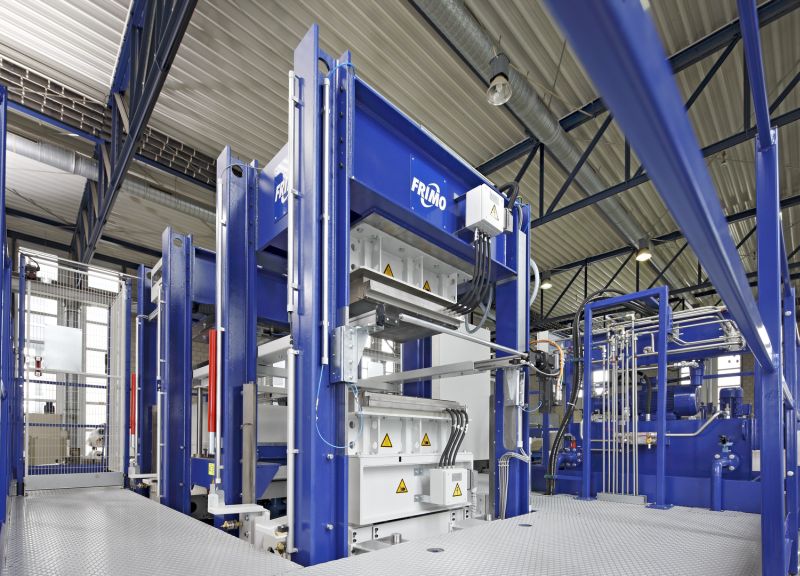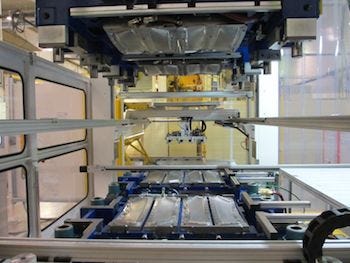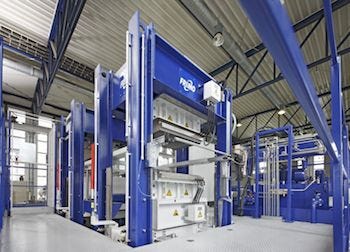Lightweight construction solutions abound at Composites Europe show
Frimo (Sontra, Germany) and its partner Schuler (Waghäusel, Germany) are presenting a broad spectrum of manufacturing solutions at the Composites Europe 2014 in Düsseldorf this October 7-9 ranging from the processing of thermoplastic organo sheets to RTM (epoxy or PU) through to natural fiber PP applications.
October 3, 2014

Frimo (Sontra, Germany) and its partner Schuler (Waghäusel, Germany) are presenting a broad spectrum of manufacturing solutions at the Composites Europe 2014 in Düsseldorf this October 7-9 ranging from the processing of thermoplastic organo sheets to RTM (epoxy or PU) through to natural fiber PP applications.
One such development is a light vehicle body realized a funded project for function-integrative lightweight construction known as Leika. Frimo is contributing expertise in the field of fiber composite materials, undertaking developments such as innovative tool systems (including multi-daylight molds) and systems technology for the manufacture of innovative metal fiber composite material (MF) sandwich semi-finished products using discontinuous compression molding. The design of handling technology to automate the loading and unloading of half-finished pieces is part of this. The Leika project involves integration of various material classes such as fiber composite materials with steel or magnesium in existing vehicle structures and production systems plays a special role.
|
Forming and back injection molding of natural fiber composite parts. |
|
Flexible thermoplastic composite processing system enables extensive analysis of product properties. |
Originally developed for the aerospace sector, Frimo's Organo Sheet Injection Process (OSI) for thermoplastic composites is now also gaining traction in the automotive sector. Processor Samvardhana Motherson Peguform (SMP) now uses the OSI process to produce door panels. The company invested in tool and systems technology with Frimo amounting to a total investment of more than EUR10 million ($12 million). In addition to the carrier presses, the scope also encompassed laminating, punching, and edge folding. At the same time this is a global project not only including volumes for Europe, but also covering the demands for China.
The OSI process combines the two work stages of forming and subsequent back injection molding for organo sheets into one process step. The preheated flat semi-finished products, e.g., NFPP (natural fiber mats + PP) or organo sheets (carbion fiber, glass fiber, aramid-fiber fabrics/mats with various thermoplastic matrix structures), are first formed in the mold and then immediately back-injected. During back injection molding, details such as mounting eyes, targeted reinforcement, or similar aspects can be integrated or the edge of the component can be finished off completely. Integrating the steps of the procedure into one single process reportedly makes considerable cost savings possible.
In another development, working with the Institute of Plastics Processing (IKV) at the RWTH Aachen, Frimo developed and put into operation a system for processing thermoplastic fiber-reinforced plastics. The TP FCSM system enables extensive analyses in the field of thermoplastic fiber-reinforced plastics on a scientific level while at the same time maintaining a high level of practical relevance.
The flexible system, for example, makes it possible to individually combine customized preforms made of nearly any desired thermoplastic semi-finished part and reinforcement textile using an inline impregnation technique. 3D preforms can be directly impregnated and consolidated without shaping using variothermic tools. The new system technology offers a wide range of possibilities for process control and a completely automatable process flow.
With the IKV system, laminates can also be created for material manufacturers and their fiber/matrix compatibility and impregnation behavior, among other parameters, can be analyzed. Even commercial prepregs such as organo sheets and hybrid textiles such as Twintex from Fiber Glass Industries (Amsterdam, NY) can be processed.
About the Author(s)
You May Also Like




